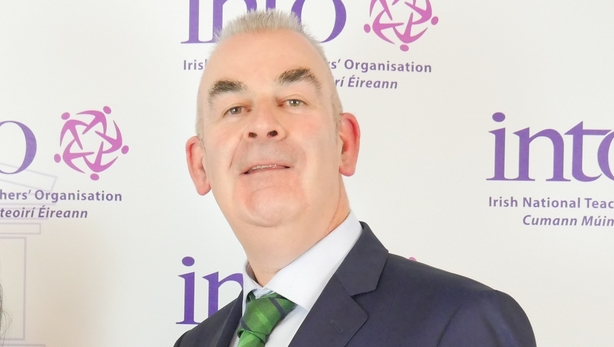Primary school teachers have strongly criticised a Department of Education decision to stop using data on the number of pupils with complex needs as a criteria in deciding the level of additional teaching support a school is entitled to.
The change was brought in in February and has faced considerable opposition from disability organisations, as well as school principals.
At their annual congress in Derry, INTO delegates instructed their union to begin negotiations to restore complex needs as a criteria for the allocation of resources.
The INTO was one of a number of education bodies that was consulted prior to the change, but yesterday INTO General Secretary John Boyle told Minister for Education Norma Foley the union's key recommendation that children with acute needs who are clearly identifiable within schools, had to be ringfenced, "was not heeded properly".
Until now, data from the HSE was used to identify children in schools with complex needs and additional teacher hours were allocated taking their presence into account.
But the Department says it has removed this criteria because the data being collected by the HSE is incomplete and patchy, and so some children with complex needs are going under the radar.
It is now giving additional weighting to the outcomes of standardised tests to compensate for the removal of the special needs criteria.

Teachers unhappy with the planned use of standardised test scores say some children who will score highly in those tests - indicating a school needs fewer resources - are the very children who need additional supports.
"I am talking about the child who can draw a map of Europe, but can’t stand the smells in the classroom at lunchtime. The girl who holds it together, and is a perfectionist in your class but then explodes at home. The boy who knows the flags of every country, but can’t stay in the room from music," teacher Alice O’Donnell told delegates.
"All of the above children may have high literacy and numeracy scores, so where are they counted? We need a system that recognises and resources children with complex needs so that we can continue to be inclusive in our schools and in our classrooms," she added
This HSE shortfall in information of children with complex needs is due to severe staff shortages, which means many children cannot get access to therapists and psychologists in order to be assessed in the first place.
Primary school teachers backed a motion calling on their union to lobby for a review of current funding models "to ensure funding is adequate to meet the needs of all children admitted to schools, particularly those with complex needs".
John Boyle said the underfunding of special education "should be a national shame and it shouldn’t be up to teachers, parents, and pupils to remind this government of their moral duty towards some of society’s most vulnerable and undervalued individuals".
Separately, INTO delegates have mandated their union to work with other trade unions for initiatives that support teachers facing housing affordability challenges, particularly in areas with high rent pressure, including the exploration of an urban allowance, and allowances for teachers who work in special education or in DEIS schools.
The urban allowance would be similar to the UK’s London weighting allowance.
However, the union has not specified which urban areas they would wish any such allowance to be linked to.
INTO calls for reinstatement teacher allowances
The union's Deputy General Secretary Deirdre O'Connor said the reinstatement of allowances for teachers would provide the "ability to target areas that are in need of recruitment or support".
The allowances previously applied to a range of individuals working in the sector including special education, people with masters or doctorates, those working in Gaeltachts, Irish language schools and islands, she said.
Speaking on RTÉ’s Drivetime, Ms O’Connor said the reinstatement of the allowances would make posts in the area of special education or teaching through the medium of Irish "more attractive".
She said a delegate had told her that "she works in a gaelscoil and in her staff room there are teachers sitting side by side doing the same job, some of them get the allowance and some of them don’t".
"That fundamental unfairness strikes people," she said.
She said this is a matter that needs to be "remedied".
Ms O’Connor said that in any career you are "rewarded for additional study" and "that has to make that post more attractive".







